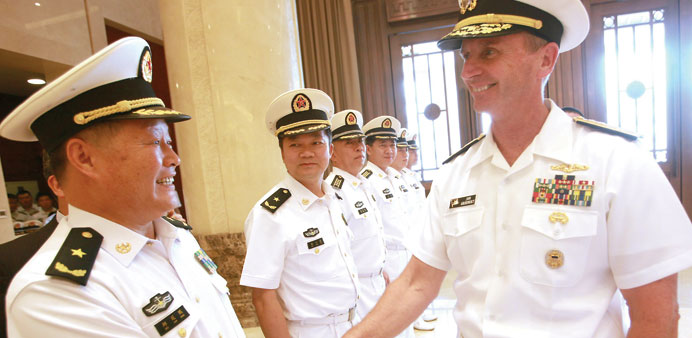Reuters/Beijing
China yesterday told the US to stay out of disputes over the South China Sea and leave countries in the region to resolve problems themselves, after Washington said it wanted a freeze on stoking tension.
Michael Fuchs, US deputy assistant secretary of state for Strategy and Multilateral Affairs, said no country was solely responsible for escalating tension in the region.
But he reiterated the US view that “provocative and unilateral” behaviour by China had raised questions about its willingness to abide by international law.
China claims 90% of the South China Sea, which is believed to contain oil and gas deposits and has rich fishery resources. Brunei, Malaysia, the Philippines, Vietnam and Taiwan also lay claim to parts of the sea, where about $5tn of ship-borne trade passes every year.
China’s Foreign Ministry repeated that it had irrefutable sovereignty over the Spratly Islands, where most of the competing claims overlap, and that China continued to demand the immediate withdrawal of personnel and equipment of countries which were “illegally occupying” China’s islands.
“What is regretful is that certain countries have in recent years have strengthened their illegal presence through construction and increased arms build-up,” the ministry said in a statement.
China would resolutely protect its sovereignty and maritime rights and had always upheld resolving the issue based on direct talks with the countries involved “on the basis of respecting historical facts and international law”, it added.
China “hopes that countries outside the region strictly maintain their neutrality, clearly distinguish right from wrong and earnestly respect the joint efforts of countries in the region to maintain regional peace and stability”, it added, in reference to the US.
Recent months have seen flare-ups in disputes over rival offshore claims.
Anti-Chinese riots erupted in Vietnam in May after China’s state oil company CNOOC deployed an oil rig in waters also claimed by Vietnam, which has also accused China of harassing its fishermen
China’s official Xinhua news agency said authorities had yesterday deported 13 Vietnamese fishermen and released one of two trawlers seized recently for illegally fishing close Sanya on the southern tip of China’s Hainan island.
Relations between China and the Philippines have also been tested in recent months by their dispute over a different area.
A Foreign Ministry spokesman in Manila said the Philippines strongly supported the US call for all sides to stop aggravating the tension.
The US wants the 10-nation Association of South East Asian Nations (Asean) and China to have “a real and substantive discussion” to flesh out a call for self-restraint contained in a Declaration of Conduct they agreed to in 2002, with a view to signing a formal maritime Code of Conduct, Fuchs said.
A US official said the issue was raised again last week with China at an annual Strategic and Economic Dialogue, a bilateral forum that seeks to manage an increasingly complex and at times testy relationship.
China’s Foreign Ministry said that it and Asean were carrying out the Declaration of Conduct and “steadily pushing forward” talks on the Code of Conduct.
Despite the tensions, the top US Navy officer, Chief of Naval Operations Admiral Jonathan Greenert, was welcomed yesterday in Beijing by his Chinese counterpart, People’s Liberation Army Navy Admiral Wu Shengli.
A US Navy official accompanying Greenert would not say whether territorial disputes would be raised during talks.
“We both acknowledge that these things exist, but the intent of these meetings is to look at ways we can work better together,” the official said.
During his five-day trip, Greenert will visit the northeastern port city of Dalian where he will tour China’s first aircraft carrier, a symbol of its growing naval might. US Defence Secretary Chuck Hagel toured the ship in April.

US Chief of Naval Operations Admiral Jonathan Greenert (right) meets senior officers during a welcoming ceremony at the PLA Navy headquarters outside
